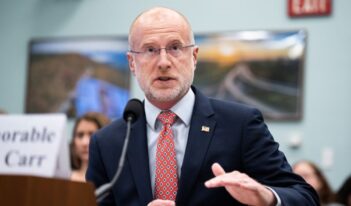
FCC’s largely duplicative functions should be redeployed to other agencies, says think tank.
Although the Federal Communications Commission’s (FCC) strategic plan includes modernization as one of its core focuses, some critics of the agency are suggesting that eliminating the agency altogether may be best to achieve modernity in communications regulation. In a comment submitted in response to a Congressional white paper, scholars from the conservative American Enterprise Institute (AEI) called for a dismantling of the agency and a redeployment of its services and resources to other agencies, citing the FCC’s outdated approach to communications regulation, and the functional overlap of its services.
The scholars primarily advocate merging the FCC’s competition and consumer protection functions with the Federal Trade Commission (FTC) in order to pair the FCC’s industry expertise with the FTC’s broad statutory authority. Functions unrelated to the FTC’s mission could be paired with sister agencies such as the Departments of Agriculture, Education, Health and Human Services, and Homeland Security. The remaining important functions that cannot find a natural home in another agency could survive “under the auspices of a new agency with limited jurisdiction and discretion,” according to the comment.
The paper containing the scholars’ comments was one of many responses submitted to the House Energy and Commerce Committee following the Committee’s request for ideas to modernize the Communications Act. The law was originally written in 1934 to regulate telephone, telegraph, and radio communications under one statute. Although overhauled in 1996, the Communications Act still suffers from a sector-based, or “silo” effect, where each type of technology is regulated separately, according to a statement by the House Committee.
The law governs several areas of communications, often with differing approaches. Some policymakers are concerned that the Communications Act’s sector-based method, of regulation can breed inconsistency and fail to address the convergence of technologies prevalent today. Furthermore, the law has often been outpaced by the speed of innovation, resulting in uncertainty with respect to authority to regulate new and changing technologies, such as the Internet.
While the FCC is responsible for regulating “interstate and international communications by radio, television, wire, satellite and cable,” and the FTC’s mission is “to protect consumers and promote competition,” the two agencies’ efforts have frequently overlapped. Some notable instances of dual oversight by the two agencies in the past include telephone marketing guidelines, the rejected AT&T and T-Mobile merger, and the protection of children on the internet.
Streamlining these services and enforcement efforts, thus eliminating duplication, would reduce “needless conflicts, confusion, and cost,” as well as provide the opportunity to transition current FCC functions from an antiquated silo-based approach to a competition-oriented one. The scholars’ comments suggest this shift would better suit current markets and ever-expanding technology.
Members of Congress and former members of the FCC, respectively, are divided over whether to overhaul the Communications Act.
Rep. Anna Eshoo (D-Calif.) has reportedly remarked that the current law “continues to provide the FCC with ample authority to exercise its role in this new environment.” Yet at a recent House Communications and Technology Subcommittee meeting, Rep. Greg Walden (R-OR) argued that the nation’s telecommunications laws “are outdated at best and some are affirmatively damaging.”
At that same hearing, Reed Hundt, former FCC Chair under the Clinton administration, said that current law has “given the FCC the ability to achieve [its] fundamental goals.” On the other hand, Richard Wiley, former FCC chair under Presidents Nixon and Ford, has reportedly stated that the very existence of “all the technological changes that have occurred since 1996, really gives substance to taking another look.”
The scholars’ comments recommend eliminating the silo-based structure, and replacing it with a “technology-neutral, competition-oriented approach.” This would allow for regulation that addresses both the emergence of differing technologies, and the development of new technologies that do not fit neatly into any silo, such as the internet. The scholars propose that competition and consumer preference would dictate market constraints, allowing free growth and development, with regulation stepping in only as necessary to abate harms not addressed by the market.
The scholars’ comments further warn of the costs associated with the current duplicative functions of the FCC. First, when agencies such as the FTC and FCC both have jurisdiction in matters related to internet regulation, for instance, “it is conceivable that these two agencies could assert conflicting authority over these areas,” creating conflicts at worst, inefficiency at best. Second, having to deal with multiple agencies on an issue creates undue burden and confusion for firms and consumers alike, both in compliance and communication. Finally, the opportunity to streamline current FCC functions and place them within appropriate sister agencies would increase effectiveness and efficiency, the scholars suggest.



